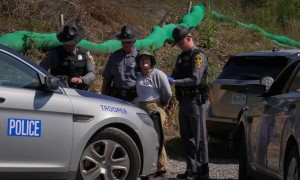Rose Abramoff & Others Risk Felony Charges ~ Chained to MVP Pipeline

Virginia state police arrest one of two protesters who chained themselves to equipment at construction site for Mountain Valley pipeline on 5 Sept 2023
From the Article by Emma Pattee, The Guardian, September 8, 2023
Virginia state police arrest one of two protesters who chained themselves to equipment at a construction site for the Mountain Valley pipeline on 5 September 2023. Photograph: Jay Mallin/Zuma Press Wire/Shutterstock
Two women climbed in the dark down the banks of the Greenbrier River in West Virginia on Thursday morning and locked themselves to a massive drill, stopping work on a controversial oil pipeline project.
One of the women, Rose Abramoff, is a climate scientist and by participating in temporarily shutting down the pipeline construction she is believed to be the first American climate scientist to risk a felony in an act of climate protest against fossil fuel projects.
“The stakes are so high,” Abramoff told the Guardian. “We cannot build this pipeline and meet our climate goals.”
The Mountain Valley Pipeline would stretch 300 miles across West Virginia and Virginia, transporting liquified shale gas. After years of legal challenges and opposition from environmentalists, the US supreme court made a ruling in July to allow construction to resume on the $6.6bn pipeline, which has been championed by Senator Joe Manchin.
According to Scientist Rebellion, a coalition of scientists who are actively protesting against climate change, over two dozen work stoppages such as lockdowns, rallies and walk-ons have taken place at the Mountain Valley pipeline construction site in the past two months. On Tuesday, two protesters who attached themselves to construction vehicles were arrested and charged with trespassing, obstruction of justice and interfering with property rights.
“Pipeline activists in West Virginia have already been issued felony charges,” said Peter Kalmus, a fellow climate scientist and member of Scientist Rebellion, who was on site at the protest in West Virginia this week, “we have a sense that police are escalating their response.”
Abramoff was arrested on Thursday morning along with the other activist, and four other activists who were sitting in rocking chairs with their legs locked in concrete barrels, blocking an access road to the construction site. Abramoff said that while she was chained to the drill, the police were threatening the activists with felonies and domestic terrorism charges.
All six activists were released later on Thursday and charged with critical infrastructure misdemeanors.
Abramoff has a long history of climate activism. Last year, she chained herself to the White House fence to bring awareness to the climate crisis, and later marched with a group of activists down a major freeway in Washington DC, stalling traffic during rush hour. In November, she chained herself to the entrance of a private jet terminal in North Carolina.
She also has already experienced the consequences of radical activism. In December of last year, Abramoff interrupted the American Geophysical Union meeting, calling on fellow scientists to join her in climate activism. In response, she was expelled from the conference and lost her job. “I’m all for decorum, but not when it will cost us the earth,” she wrote in an op-ed for the New York Times. “I used to be a well-behaved scientist. I stood quietly on melting permafrost in Utqiagvik, Alaska, and measured how much greenhouse gas was released into the atmosphere … When scientists take action, people listen.”
Kalmus says that more and more scientists are willing to risk arrest, and their reputations, because of alarm over the climate emergency. “The thing that’s stopping a lot of more scientists from doing this kind of activism is that it’s scary. It’s socially scary, you risk your job, you risk your status among your colleagues, you risk criminal charges. But I know just from having beers with other scientists, that as a community, we’re pretty terrified by our own science.”
For Abramoff, the risk of going to prison is scary, but the alternative is unthinkable: “We can’t keep expanding fossil fuels. It just can’t happen.”
Spokespeople for the Mountain Valley pipeline have previously described the project as being subject to “unprecedented scrutiny” that will raise the bar for the “safe construction of linear energy infrastructure”, while helping towards goals for lowering carbon emissions.
Last week a non-violent environmental activist, Mylene Vialard, was found guilty of felony obstruction for her role in trying to halt construction of a fossil fuel pipeline through Indigenous territory in Minnesota.
This week a sweeping indictment announced in Atlanta alleging that opposition to a police and fire department training center known as “Cop City” adds up to a criminal conspiracy heightened concerns about a chilling effect on protest everywhere across the US.
#######+++++++#######+++++++#######
NOTE: I hope you appreciated this article. Before you move on, I was hoping you would consider taking the step of supporting the Guardian’s journalism. EDITOR Guardian US, Betsy Reed, 9/8/23.